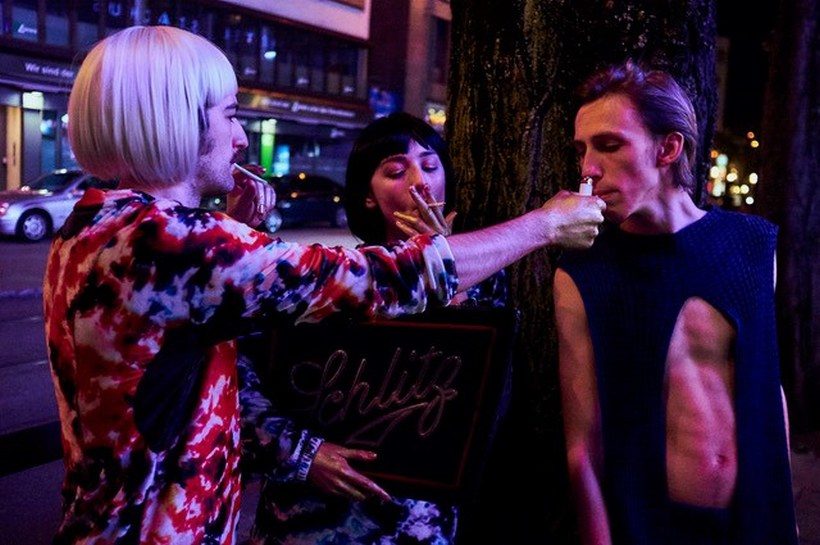
„pretty boyz don´t die“ (2016) © Jovana Reisinger, Setfotografin: Sophie Wanninger
“Everyone can see that your body is high-class. You have to make something out of it. Why are you so sad? You haven’t been sitting in front of the TV of life, you have been active. What a guy!” – an off-screen male voice accompanies Max the model as he rambles around looking for a hotel in a city where a male-model killer is up to mischief. The video piece “pretty boyz don’t die” (2016) forms the beginning to the “pretty pretty mad sad” (2016-18) four-part short film series and is the first filmic work by the writer and filmmaker Jovana Reisinger. What this scene already captures is Reisinger’s enduring interest in the sense of being subjected to a society driven by high performances and self-optimisation. Promising expectations of happiness are being stoked within such a society, apparently normative body images and role models are reproduced, existing power structures are being adhered to and we are conned into believing that social status is solely dependent on our own efforts and discipline – any pitfalls are due to one’s own idleness within this narrative.
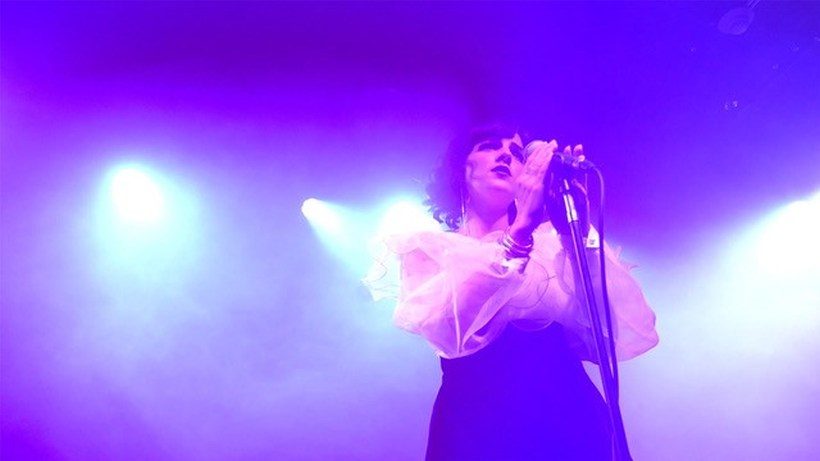
„mad girls don´t cry“(2018) © Jovana Reisinger
When Max the model subsequently stops at an illuminated advert with a graphic image of the Brooklyn Bridge crowned with lights, the off-screen narrator clarifies the rules: “That’s our huge world showcased in one tiny window. You have to work really hard before the real world lies down at your feet.” Commencing with the narrative of the American Dream, which is pursued literally in the third part of “mad girls don’t cry” (2018) when the protagonist Natalie travels to the USA to finally become a starlet, Reisinger knows how to avail of and exploit these myths closely associated with pop culture and the USA-centric worldview, also on an aesthetic level – with neon signs, Anglicisms, prints of the US-American flag, cowboy/cowgirl looks, the idea of the global star – in order to tackle and explore the wider subject of merciless self-optimisation and the strivings for success linked to this, as well as the industry behind it all. This preoccupation is consistently found throughout Reisinger’s artistic work. In “pretty pretty mad sad” (2016-18), the female protagonists’ eyes are always focused on an object or person of desire that promises social advancement, and this also moves the external plot forward stylistically. For the barwoman Linda this is marriage with the successful model Max, for Natalie it is her breakthrough in the USA. Both of them fail despite or because of their adhering to longstanding approaches that promise happiness. The narrating of success as an ostensive storyline is lived out rigorously and excessively, supported by the male moderator/coach who parades the female protagonists especially in their failings, comments cynically on their actions, gives them advice and, through these gestures of power, serves the existing patriarchal system that forces people into traditional role models.
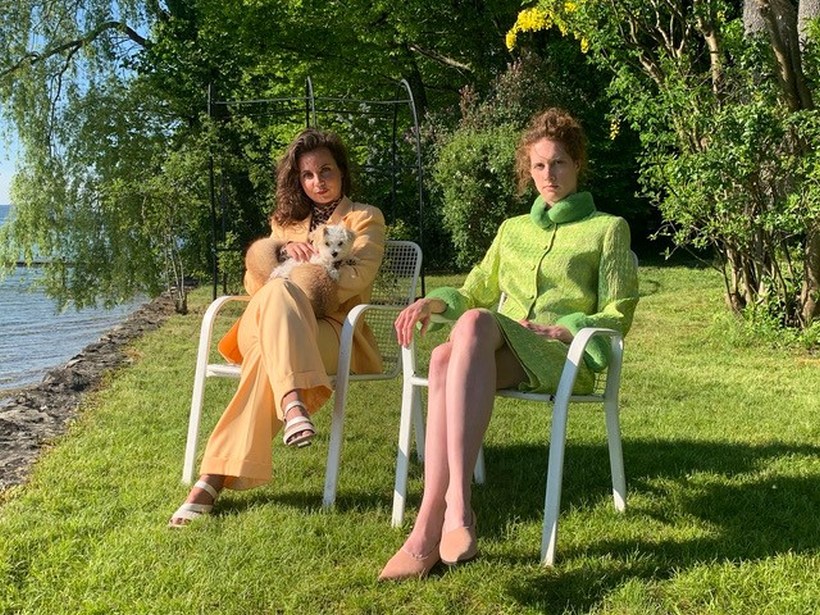
„Die klaffende Wunde“ (2020) © Jovana Reisinger
“Die klaffende Wunde” (2020) in turn presents a humoristic reversal of the view that within performance-driven cultures, mental illnesses must be repressed or overcome as quickly as possible. Here, stoic understanding constitutes the reaction to worries articulated about a depressed female friend. Responding to Martha’s appeal to help a friend, “Maria says she doesn’t want anything, now she’s lying down and refusing to get up again”, Petra – who has just then taken her tablets and is already sitting in a garden chair looking dimly out at the lake – answers casually with, “Just let her have a lie down if she wants to”. The video, which was produced for the Fassbindertage film event on Fassbinder’s 75th birthday anniversary, provides space for narrating this state of weariness and tiredness, one that can also be experienced stylistically in the drawn-out words and indifferent attitude displayed by Petra. The indicated ill state of the absent person Maria, which drives the dialogue, finds its expression and presence in Petra; the whole scene reveals itself to actually be a sick visit to Petra, when Martha praises the lovely flowers and caringly asks if she should help get Petra into the bed; likewise, the image found so often in film and literature of the isolated sick person looking into the landscape provides an indication of this here. The transferring of the medical history to an anonymous third person, Maria in this case, subtly refers to the societal repression and stigmatisation of mental illnesses, which is acknowledged here in an emphatic, humorous and refreshingly casual way.
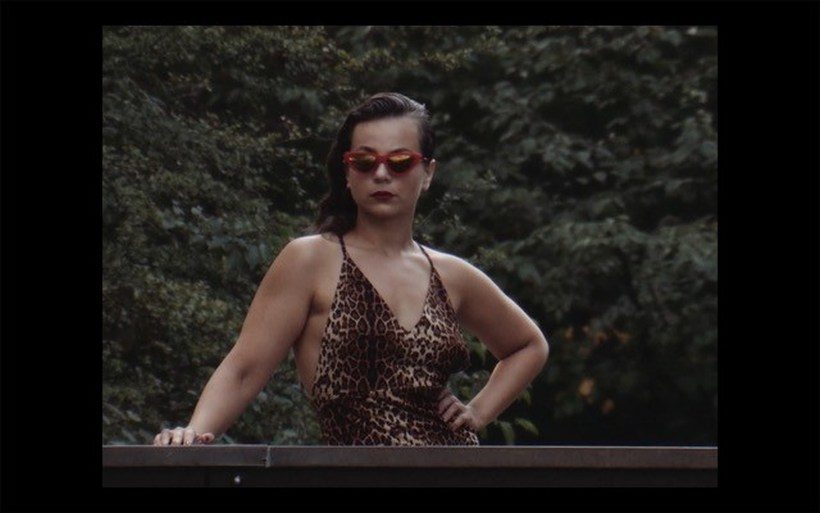
„pretty girls don´t lie“ (2017) © Jovana Reisinger
As the sociologist Anja Röcke far-sightedly gathers in her book “Sociology of Self-Optimization”, since the mid-20th century self-optimisation has developed “into a central idea and even a guiding concept for the present, which are widely compatible, as indeed contested and criticisable.” Doing so, they permeate the most diverse areas, such as therapy, counselling, health, happiness, beauty and professions, thereby demanding both mental and physical performance capacities that also attempt to confirm more than to overcome dominant societal perceptions, such as the assumption of a binary gender system and the categorisation of body images. (Anja Röcke, 2021) While the focus on success prevails more among men, the correcting of bodily deficiencies is more to the fore with women and even clarifies the preservation of a gender differentiation that grants/denies certain attributes to women and men. In “pretty pretty mad sad” (2016-18) this is already illustrated in the work’s title. As per the off-screen commentator, Max the model with his successful life is not permitted to have feelings of sadness and loneliness; the gang of men in “Sad Boyz Get High” (2018) seem to be too considerate and sensitive in their role as drug dealers, and thus they remain barely seen; the outtakes inserted in “pretty girls don’t lie” (2017), such as a faded-in teleshopping spot in which rejuvenation products for women are being sold, expose how the moderator’s female assistant is kept small and is roughly cast aside as soon as her behaviour no longer corresponds to the male idea of “feminine”. This subject is treated even more inclusively in the six-part talk show “Men in Trouble” (2021) when Reisinger devotes herself individually to the six subjects of happiness, love, money, sex, beauty and belief, using a daily-talk format as her basis.
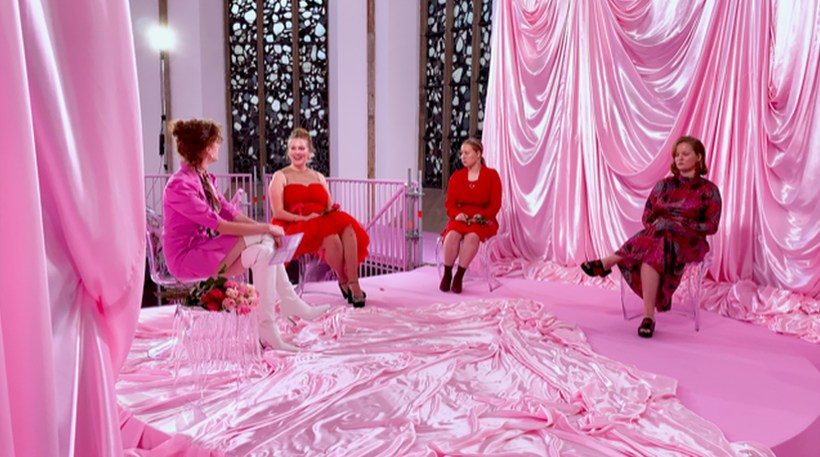
„Men in Trouble“ (2021) © Jovana Reisinger
Reisinger’s visual language and dialogue frequently live from the referential allusions to differing and mostly bygone television formats, such as talk shows, daily-talks or teleshopping. Her return to the now-superseded main medium of television creates an anachronistic moment that works through current social questions about outdated formats that found their way into German television from the 1990s and suggested a closeness to society, also by their maintaining a supposed connection with the viewers. People were shown and presented here as one-sided and focusing on a single subject, and this thus encouraged categories such as “normal and “different”, which were subject to patriarchal though patterns, so to speak. But also the industry flooding the markets with products in reaction to this reinforced this fragmented societal image.
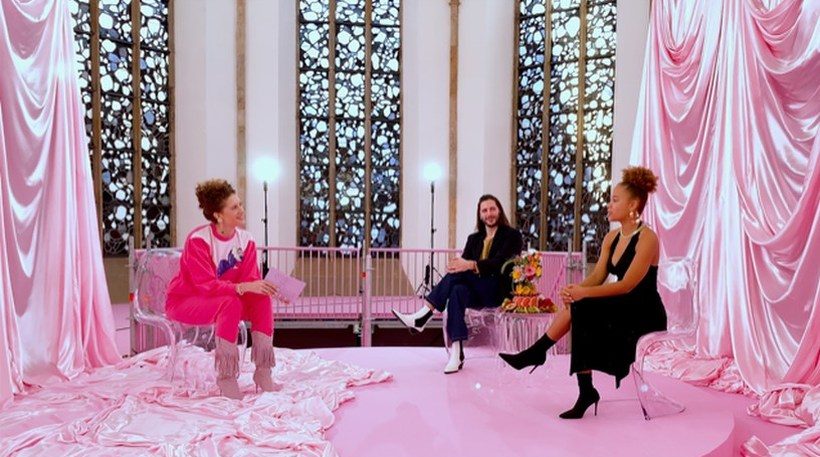
„Men in Trouble“ (2021) © Jovana Reisinger
Patriarchy also prevails in Reisinger’ works – and indeed how could it be otherwise. Overblown, clichéd, repetitive, shameless and monotonous, thus it appears in her work. Rude men who reproduce gestures of power and sexism, who condescendingly judge and denounce physical appearances and actions, who control the overt plot or storyline – especially when the female protagonists threaten to break free from their outdated role models. In “Men in Trouble” (2021), which was created as part of the “Enttäuschung” (Disappointment) exhibition and educational programme at the Kunsthalle Osnabrück venue, as well as in “Beauty is Life” (2020), these power structures are also situated in the off-commentary and narrate the societal predominance of a male-dominated authority through this shifting to a filmic level that surveys the storylines. The opening sequence in “pretty boyz don’t die” (2016) – in which the artist stages and plays herself as a medial character, as she also does in further works – follows a conversation between two women at a night-time curried sausage stand and makes it clear that discriminatory opinions can also be perpetuated by women, when they serve heteronormative notions and badmouth people who fall out of the normative expectation categories: “Donna Dollar is always late and is dressed like a hooker… Sometimes I feel ashamed for my own sex because of her.” Shallow characters, such as Max the model, the moderators in the Super Blond 3000 contest and the teleshopping spot, as well as the guests (women 1 to 9 and men 1 to 4) in “Men in Trouble” (2021), personify certain aspects within the rigid patriarchal-capitalist structures that Reisinger always opposes through a constantly changing dynamic by juxtaposing, combining and offsetting the filmic areas of the costumes, camera, dialogue, cast, sound and the inclusion of texts – whether through superimposed texts, slogans, neon signs or prints. In this way, she develops her socio-critical spaces and permits them to become legible, anticipating a diverse, equitable society liberated from its inscriptions.
In this regard, the dialogue and the inclusion of language and text are accorded a special role, because text always forms the basis for Reisinger’s artistic work. In her video works, she assembles dialogues and monologues from slogan-language, exaggerated motivational announcements and advertising catchphrases, clichés and proverbs repeated too often, where they seem to become meaningless and obsolete. In this way, Reisinger exposes inscripted and repetitive mechanisms, and undermines them with their own means. The facial expressions and gestures of the performers, as indeed Reisinger’s carefully considered choice of styling, costume and casting, defies and rebels against this deep-set system, and reflects people in their versatility and their ability to further develop themselves.
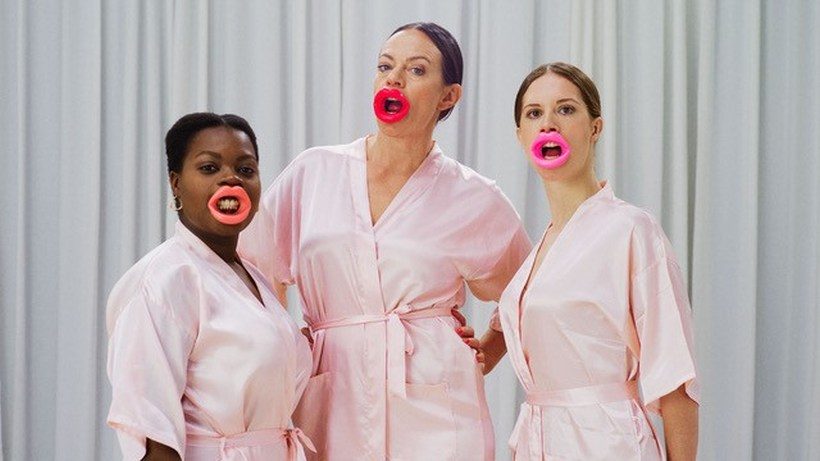
„Beauty is Life“ (2020) © Jovana Reisinger
The feminist scrutiny of the current role of the woman especially constitutes a dominant subject for Jovana Reisinger. “Beauty is Life” (2020) looks specifically at the female body as a constant object of desire, as well as of deficiencies. All of the beauty gadgets, from vaginal tightening sticks to vibrating bras through to smile trainers that illustrate the democratisation of industry-driven beauty therapies, are initially presented here, humming and buzzing, by model-like by women in a beauty salon that has been named after the artist herself. Doing so, they exemplify the influence of the beauty industry that teaches women from an early age to always question and scrutinise their own bodies. The sterile and reduced aesthetics – transparent furniture, one single bonsai, pale-pink silk bathrobes, frontal camera – direct our focus to the optimising beauty applications and confirm the striving for flawless perfection. Progressively, irritating and disjointed moments disrupt the smooth progression of the therapies being shown. Moments that develop from the sound, camera, facial expressions and gestures of the performers and in this way successively gain a critical resonance space that ends in a second part with a round-table discussion, during which the role of the female body of women is reflected upon and discussed. Doing so, the filmmaker is, when we view the cast, always striving to depict diversity and, especially in “Beauty is Life” (2020), to have a multisided (body) image of women. Reisinger’s critique is always preceded by the attempt to reveal the given structures in their traditional value judgements and aesthetic conventions, to make them visible, in order to be able to face them critically and break them open.
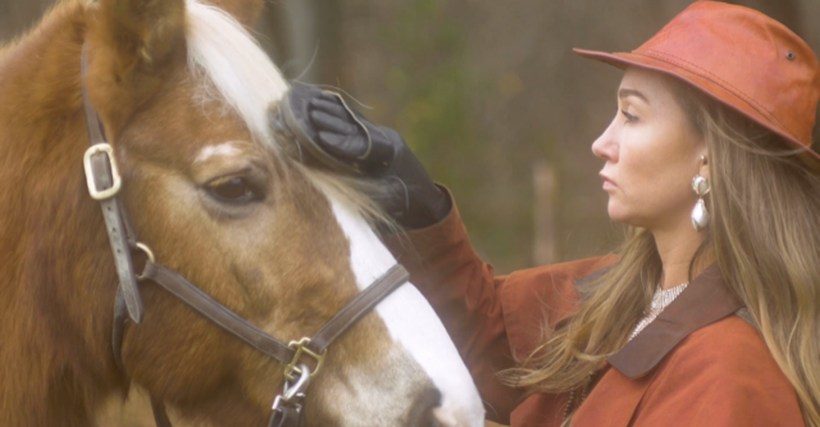
„WENDY“ (2019) © Jovana Reisinger
In “Men in Trouble” (2021), for instance, a glittering and lavish pink television studio is set up as the male boardroom in order, through the narrative, to flirt with impending “feminisation” and “men’s fear of loss” within feminist movements. The video piece “WENDY” (2019), conceived as a trailer, recounts the rescue by a female rider of a cowardly young man hopelessly calling out for help in a wood. Doing so, it liberates the purely male-reproduced role of the rider, knight and rescuer from its patriarchal shackles. Even Natalie, who gets lost in the USA without any money in “mad girls don’t cry” (2018), is rescued by a woman. In her works, the artist creates a cinematic structure consisting of provocative emulations of petrified, discriminatory and success-oriented societal mechanisms and images that reflect our society marked by diversity and fluid gender images. The sluggish and tedious overcoming of patriarchal mechanisms especially becomes comprehensible in Reisinger’s filmic works and, doing so, even casts a light on the setbacks associated with this. From a feminist perspective, the filmmaker highlights sex, gender and sexuality especially within the existing power structures, and that always in a humorous manner, whether by reversing familiar narratives and role models, or in the form of overblown re-narrations that live from Reisinger’s precise observations.
Jovana Reisinger works as a writer and filmmaker. After completing communications design at the Munich University of Applied Sciences, she studied screenwriting at the HFF Munich film school (graduated in 2019) and was also awarded her Diploma Documentary Directing (2019). Her debut novel “Still Halten” was published in 2017 by Verbrecher Verlag publishers and went on to win the Bayern 2-Wortspiele-Preis award in 2018. She was awarded a resident scholarship at the Literary Colloquium in Berlin, as well as a resident scholarship from the Goethe Institute China in 2019. Her second novel “Spitzenreiterinnen” was released in spring 2021, also by Verbrecher Verlag publishers. She has shot various short films that have been screened in exhibitions and at festivals, including the Kunsthalle Osnabrück (2020-2021), Goethe Institute Paris (2020), yi: project space Beijing (2019), KV – Verein für zeitgenössische Kunst Leipzig (2019), Kunstverein Munich (2018) the International Short Film Festival Oberhausen (2017, 2019, 2021), the Hamburg Short Film Festival (2021), Underdox Festival (2017, 2019, 2020) and Woche der Kritik (2019). Since 2020 she has written the “Bleeding Love” menstruation column for Vogue Germany.
Filmography
pretty boyz don´t die (2016)
pretty girls don’t lie (2017)
mad girls don’t cry (2018)
sad boyz get high (2018)
WENDY (2019)
Beauty is Life (2020)
Die klaffende Wunde (2020)
Men in Trouble (2021)
1 Trackback